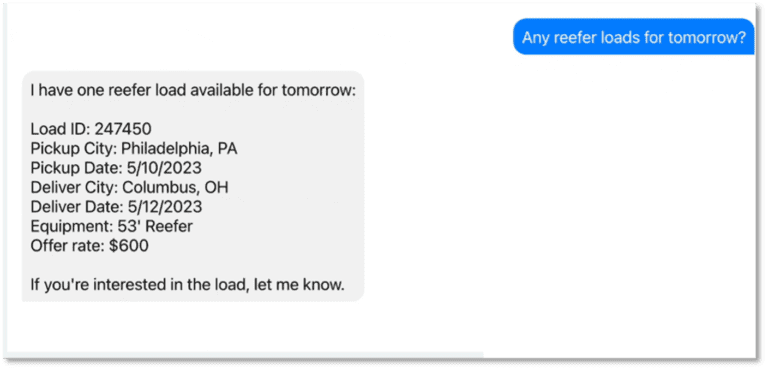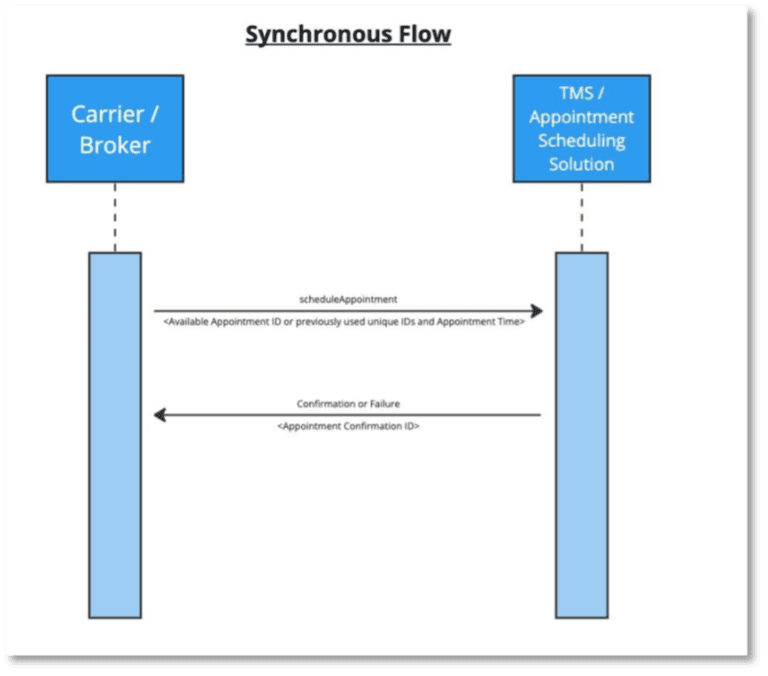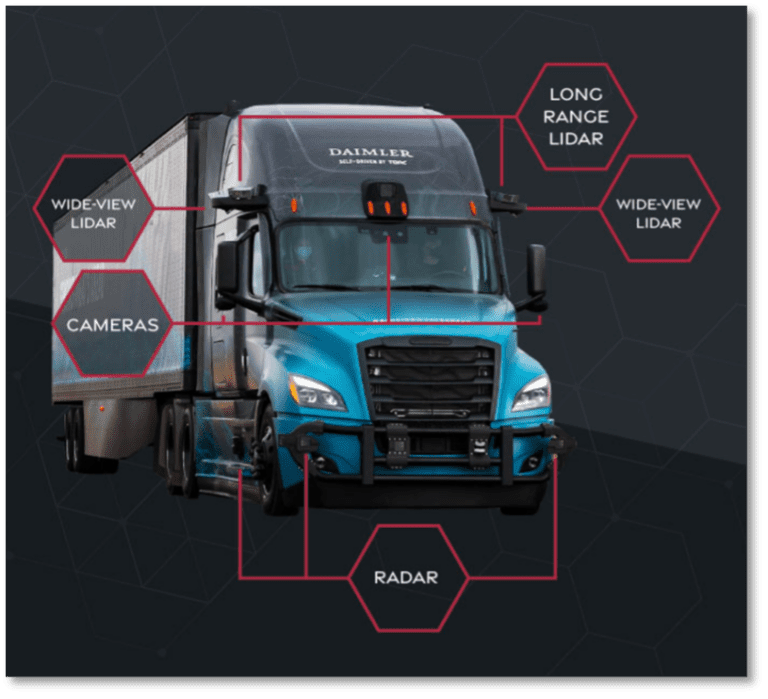During the two-day event, leaders in the space met to “look around the corner” and see what’s next in the world of logistics; specifically, which nascent technologies today may become commonplace 5-10 years from now. Spotlighted below are three technologies that particularly stood out due to their innovative use cases. Simply put, these technologies may surprise you with how far along they’ve come.
Parade CoDriver
By streamlining time-consuming parts of the freight booking process, Parade TMS is building powerful technology to connect and automate America’s transportation industry.
Value proposition: Increase loads per rep1
Brokerages have long struggled to increase the operational efficiency of their freight agents; with historical shipments, each agent may be able to coordinate between 10-20 per day. Parade has identified a highly topical solution to drive greater operational efficiency (and loads per rep) by integrating its transportation management system with ChatGPT (have you heard of it?!?).
The tool, called Parade CoDriver, leverages OpenAI’s latest advancements in AI to process emails and phone calls from carriers. CoDriver reduces the administrative burden of responding to emails and calls (via phone transcription) by auto-drafting responses subscribing to the correct quoting and negotiation strategy via integration with Parade’s capacity management functionality. The beta version is anticipated to be released later this year, and it will be interesting to monitor the extent to which it augments key agent productivity metrics.
Encouragingly, CoDriver stands to enhance existing agents’ workflows vs. require? net new ones, avoiding many of the pitfalls of training and adoption in this industry.

Sample auto-draft response via GPT3 integration (from Parade website)
Freightapis.org
Convoy, J.B. Hunt, and Uber Freight formed the Scheduling Standards Consortium (SSC) to simplify the integration of systems across the fragmented ecosystem between shippers, carriers, and intermediaries and create a more efficient appointment scheduling process.
Value proposition: Automate appointment scheduling
Appointment scheduling is a highly manual process that has plagued logistics providers for some time. The solutions today – offshoring and RPA – offer more efficient workflows, but do not address the core challenge of low-quality, non-standardized scheduling data. This inefficient process has two major costs: Labor (cost of hiring resources to set up appointments at the dock level) and time (delays appointment scheduling causes in booking the freight).
The recently established Scheduling Standards Consortium (SSC) aims to automate the highly variable appointment process to align on data standards for interoperability. The terminology which shippers, carriers, and brokers use to reference an appointment may vary, and as a result efficiencies can be unlocked by communicating key definitions for items such as load and dock groups. SSC’s list of partners continues to grow (Echo, Blue Yonder, Oracle, e2open, Arrive Logistics, Coyote, among others) and brings the industry one step closer to digitizing the full lifecycle of a transaction.
Considerable work remains to operationalize this effort: Technical standards have yet to be published, but they are anticipated to be used in production environments on live shipments by Q4 2023.

Excerpt from schedule appointment requirements documentation at freightapis.org
Torc
An autonomous vehicle leader since 2007, Torc is commercializing self-driving trucks for safe, sustained, long-haul innovation in the freight industry.
Value Proposition: Deliver loads more safely and efficiently via autonomous truck
Torc is another reminder that the technological shift that stands to disrupt the entire logistics industry – autonomous trucking – remains looming. The largest barriers towards adoption have historically been technology and regulation; however, the biggest obstacle is increasingly the latter, with states such as California recently banning the practice altogether. Numerous players actively complete supervised autonomous trucking deliveries, and competitor TuSimple executed several fully autonomous runs in China just days ago with no safety operator.2
Torc’s autonomous fleet actively delivers freight via supervised pilot runs for logistics providers such as Schneider. Uniquely, trucking manufacturer Daimler acquired a majority stake in Torc in 2019, and this partnership arms the company with deep expertise in trucking design as it seeks to layer on LIDAR, Radar, and cameras onto its long-haul Class 8 truck.
The foray of blue-chip manufacturers such as Tesla, Waymo, Volvo, and Mercedes-Benz into the autonomous trucking arena further underscores the likelihood of this paradigm shift, though the exact timing of adoption remains uncertain.

Excerpt from Torc.ai
Keep a watchful eye on these tech developments in the months ahead
Often, the most daunting aspect of commercializing a technology isn’t in its design, but rather in the development of practical functionality and the pursuit of customer adoption. The aforementioned vendors have proposed intriguing theoretical use cases, but how these unfold in real-world scenarios remains to be seen. Logistics leaders should maintain a vigilant watch on these developments and other nascent trends in the field to distinguish between viable opportunities for competitive differentiation and mere unsubstantiated hype.
For further discussion on key takeaways from the event, please get in touch!
1 “Loads per rep” in the freight brokerage community refers to the number of loads or shipments that a single freight broker representative or agent can manage or coordinate in a given period, usually daily or weekly. This term is used to gauge productivity and efficiency within a freight brokerage firm.
2 Another reason TuSimple may have shifted pilot testing to China: An April 2022 autonomous vehicle crash that has drawn increasing scrutiny from the FMCSA






